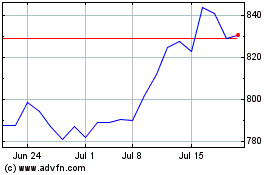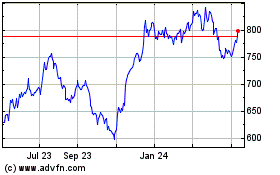By Justin Baer, Dawn Lim and Cara Lombardo
Many of the world's biggest investment firms helped elect
directors proposed by an upstart environmental-activist fund to
Exxon Mobil Corp.'s board. While votes are still being counted,
BlackRock Inc., State Street Corp. and Vanguard Group have said
publicly they wielded votes for investors in favor of at least two
dissident directors.
The proxy battle was the biggest test yet of Wall Street's
receptivity to a campaign about the risks posed to business from
climate change and the transition away from fossil fuels. Large
investors have been criticized for being all talk and no action on
getting the companies they invest in to change their policies
around sustainability. Exxon's yearslong refusal to make board
directors available for frank conversations irked investors.
Energy giant Exxon fought hard to fend off the dissident slate.
Company officials continued to lobby shareholders even as
Wednesday's annual meeting neared adjournment.
Exxon said it welcomed the new directors, Gregory Goff and Kaisa
Hietala, and looked forward to working with them. "With almost
three million shareholders, it's not surprising we heard a wide
range of views, and many supported the work that we're doing to
improve earnings and cash flow capacity, as well as the work to
advance the company to a lower carbon future," a spokesman
said.
"Today, we heard shareholders communicate a desire for
ExxonMobil to further these efforts. We're well-positioned to do
that."
The vote is expected to draw the lines between funds willing to
take a more aggressive posture on climate issues and those who are
more reticent.
"This moment is a big victory for what was a fringe
environmental activist movement a few years ago," said Jonathon
Zytnick, research fellow at New York University School of Law's
Institute for Corporate Governance & Finance. "For individual
investors it could really affect what funds they put their money
in."
Exxon, with roots dating back to the time of oil baron John D.
Rockefeller, was an easy villain for Wall Street to rally against.
Climate activists have painted it as a symbol of American excesses
that contributed to climate change, and the company was coming off
a tough period financially. The energy company has been criticized
as being less willing to make environmental concessions.
With only a roughly $50 million stake in the $250 billion energy
company, Engine No. 1 ran a six-month, $30 million campaign
centered on pushing the oil giant to commit to carbon neutrality.
It had a powerful ally. California State Teachers' Retirement
System, the nation's second largest public pension fund, pledged
support from the start.
Institutional investors only get the chance to formally weigh in
on high-profile proxy contests every few years, given that most
companies avoid drawn-out battles with activists by striking
settlements ahead of shareholder votes.
It was the third time the nation's largest public pension fund,
California Public Employees' Retirement System, or Calpers, faced
off against the company in the past decade. Along the way, Exxon
often fought off dialogue between the board and its largest
shareholders, said Anne Simpson, head of corporate governance at
the pension fund.
"It has been like pulling teeth to get Exxon directors to talk
to investors," Ms. Simpson said.
An Exxon spokesman said the firm has been "very actively engaged
with our shareholders, sharing our plans and hearing their
viewpoints and the key issues of importance to them." He also said
that shareholders are free to contact independent directors.
New York State Common Retirement Fund joined Calpers in pledging
support for Engine No. 1's candidates.
Calpers said it publicly backed the activist campaign because it
believed Exxon had repeatedly failed to address the lack of
energy-industry experience on the board.
The investors backing Engine No. 1 turned into a who's who list
of Wall Street.
BlackRock voted for three directors proposed by Engine No. 1 and
expressed concerns with Exxon's strategic direction and the impact
on its financial performance in the long term.
Vanguard voted for two directors proposed by the activist.
"Over the years, we have shared with Exxon our concerns about
the lack of energy sector expertise in its boardroom and questions
about board independence," Vanguard wrote in a bulletin. "And for
years, we did not witness sufficient progress on either front."
Exxon added two directors to its board earlier this year, saying
that they were part of a continuing effort to refresh the company's
board and reflected ongoing talks with investors.
At least some Fidelity funds voted for Engine No. 1 directors,
according to people familiar with the matter. T. Rowe Price Group
Inc. voted for three of the four dissident directors, the company
said Thursday.
"There are many reasons you may have wanted to hold Exxon
accountable for many years," said Jessica Strine, chief executive
of advisory firm Sustainable Governance Partners. "This is the
moment for many investors where they had to decide if they would
let it pass by or not."
On Wednesday, Exxon's annual shareholders meeting stretched on
for hours. As the historic shareholder fight hung in balance, Exxon
called a roughly one-hour recess in the middle of the meeting.
During that time, Exxon representatives made calls to investors in
a last-ditch attempt to win their votes, said people familiar with
the matter. Unlike a regular political election, voters can change
their vote up to when polls close.
"This is not seemly, it's not fitting for a board of a company
of Exxon's esteem and history," Ms. Simpson said. Calpers, she
noted, has been a shareholder in Exxon and its predecessor
companies for more than 150 years, a period that dates back to its
origins as part of Standard Oil.
Engine No. 1 also made last-minute calls to ask shareholders to
stand firm. BlackRock was among those who got a call from the
activist fund.
There was some confusion around the votes from State Street
Global Advisors, the asset management division of State Street
Corp. Early this week, preliminary vote tallies indicated that it
was backing three dissident shareholders, people familiar with the
matter said.
A spokesman for State Street said the firm reached a final
decision to go with two dissident directors on Tuesday, the day
before Exxon's meeting.
When other shareholders asked State Street representatives why
it appeared they changed the votes, the officials said the earlier
support was a default position based on a proxy adviser's
recommendations, people familiar with the matter said. The firm
told the people it always intended to make its own choices, and did
so on Tuesday.
A State Street spokesman said the firm was never pressured to
change its votes. "We followed our standard processes leading up to
annual meetings and submission of recorded proxy votes, including
analyzing all proxy contests on a case-by-case basis and do not
follow the recommendations of proxy advisors."
The votes are still being tallied by an independent party now,
and Engine No. 1 could yet pick up another seat in the coming
weeks.
For Engine No. 1, launched by investor Chris James with roughly
$250 million under management, the campaign was a referendum on its
focus of combining environmental concerns with a company's
financial outlook.
"It's not like we were asking people to take off their investor
hats. We were just making the case that as long-term investors they
should support us," said Charlie Penner, a longtime activist
investor who helmed Engine No. 1's campaign. "That's how you
win."
Write to Justin Baer at justin.baer@wsj.com, Dawn Lim at
dawn.lim@wsj.com and Cara Lombardo at cara.lombardo@wsj.com
(END) Dow Jones Newswires
May 28, 2021 16:49 ET (20:49 GMT)
Copyright (c) 2021 Dow Jones & Company, Inc.
BlackRock (NYSE:BLK)
Historical Stock Chart
From Mar 2024 to Apr 2024

BlackRock (NYSE:BLK)
Historical Stock Chart
From Apr 2023 to Apr 2024
